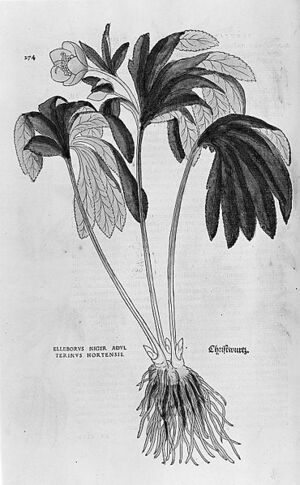Hellebore (nonfiction): Difference between revisions
Jump to navigation
Jump to search
No edit summary |
|||
| (6 intermediate revisions by the same user not shown) | |||
| Line 1: | Line 1: | ||
Commonly known as '''hellebores''' /ˈhɛlᵻbɔərz/, the Eurasian genus ''Helleborus'' comprises approximately 20 species of herbaceous or evergreen perennial flowering plants in the family ''Ranunculaceae'', within which it gave its name to the tribe of ''Helleboreae''. | [[File:Black_hellebore.jpg|300px|thumb|Black hellebore.]]Commonly known as '''hellebores''' /ˈhɛlᵻbɔərz/, the Eurasian genus ''Helleborus'' comprises approximately 20 species of herbaceous or evergreen perennial flowering plants in the family ''Ranunculaceae'', within which it gave its name to the tribe of ''Helleboreae''. | ||
The scientific name ''Helleborus'' derives from the Greek name for ''H. orientalis'', ἑλλέβορος ''helléboros'', from ''elein'' "to injure" and βορά borá "food". | The scientific name ''Helleborus'' derives from the Greek name for ''H. orientalis'', ἑλλέβορος ''helléboros'', from ''elein'' "to injure" and βορά borá "food". | ||
| Line 9: | Line 7: | ||
Despite names such as "winter rose", "Christmas rose" and "Lenten rose", hellebores are not closely related to the rose family (''Rosaceae''). | Despite names such as "winter rose", "Christmas rose" and "Lenten rose", hellebores are not closely related to the rose family (''Rosaceae''). | ||
== | == In the News == | ||
<gallery> | |||
</gallery> | |||
== Fiction cross-reference == | == Fiction cross-reference == | ||
* [[Helleborus (criminal)]] | * [[Helleborus (criminal)]] | ||
== Nonfiction cross-reference == | |||
* [[Poisoners (nonfiction)]] | |||
* [[Siege of Kirrha (nonfiction)]] | |||
== External links == | == External links == | ||
Latest revision as of 06:36, 10 June 2022
Commonly known as hellebores /ˈhɛlᵻbɔərz/, the Eurasian genus Helleborus comprises approximately 20 species of herbaceous or evergreen perennial flowering plants in the family Ranunculaceae, within which it gave its name to the tribe of Helleboreae.
The scientific name Helleborus derives from the Greek name for H. orientalis, ἑλλέβορος helléboros, from elein "to injure" and βορά borá "food".
Many species are poisonous.
Despite names such as "winter rose", "Christmas rose" and "Lenten rose", hellebores are not closely related to the rose family (Rosaceae).
In the News
Fiction cross-reference
Nonfiction cross-reference
External links
- Hellebore @ Wikipedia
